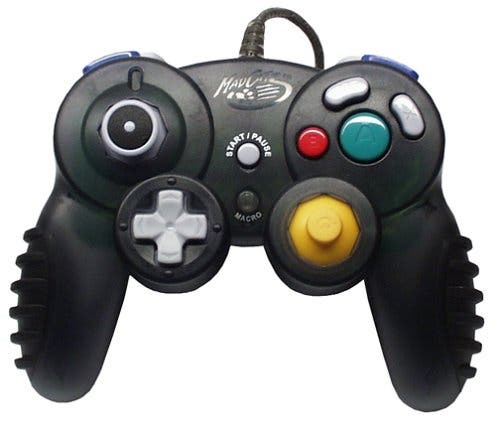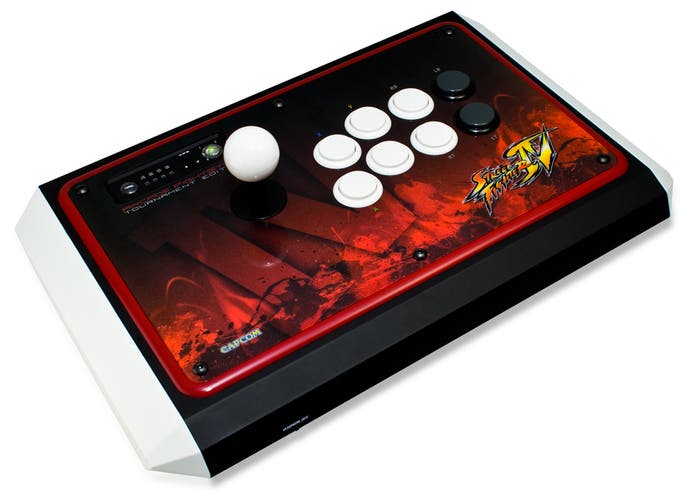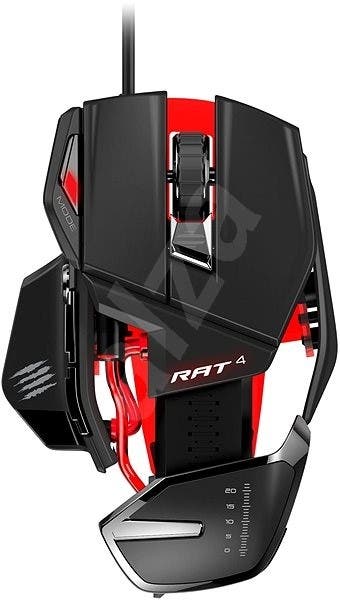How Mad Catz used up its last life
A story of mice, turkeys and Mad Catz.
You may well remember Mad Catz fondly from your childhood.
The company, founded in 1989, was one of the go-to brands for third party controllers and other accessories. They weren't always the best; but they were cheap and generally offered value for money. They were also behind some top quality fighting game sticks, as well as some popular PC accessories like the RAT range of mice.
Yet on March 30th 2017, after a few wobbly years, the peripherals and hardware firm bit the dust and filed for bankruptcy. And while It's very easy to blame the poor performance of Rock Band 4 for the demise of the company, that was merely the latest in a string of bad decisions going back nearly six years.

In fact, when asked for their reactions to the news that Mad Catz had gone into administration, former employees admit they were surprised the company survived into 2017.
"My first response was: 'I can't believe it lasted this long'," says former Mad Catz VP and Tritton founder Chris von Huben, who left the firm in 2014, says. "In my mind, Mad Catz had been doomed for three years."
Aaron Smith, former product manager at Tritton and Mad Catz, who also left in 2014, adds: "I can't say there was any shock from my side, either. It was a long time coming. They hung on for a lot longer than I expected."
One senior director admits they "felt surprisingly empty" when they heard the news.
"I actually thought I'd feel more given that such a large part of my career had been spent at Mad Catz and I invested so much of myself into the business," they say. "Ultimately, the writing has been on the wall for a very long time and you had to be blind to see it not ending this way."
So what went wrong?
In 2011, Mad Catz was having a stellar year off the back of the success of Rock Band 3 and following its $1m purchase of audio specialists Tritton. "The company felt like it was on such a high and decided to go on a spurt of random things that it felt would bolster success," von Huben says."It wanted to spread out."
What followed was a series of poor, seemingly random and often crazy or ill-informed decisions. What might have been mistaken for ambition at the time can be seen as nothing but hubris in hindsight.
Take the decision to publish and distribute 2011's Jonah Lomu Rugby Challenge in North America. Rugby isn't popular in the region, so the product failed to hit the mark.

Then look at Mad Catz's aim to get into games development in June 2011 with ThunderHawk Studios. The team was tasked with making flight sim MMO Saitek Combat Pilot, designed to help Mad Catz sell Saitek simulation peripherals. While this did ultimately launch, it was hampered by a lack of internal expertise.
"To quote one of my colleagues: 'Mad Catz decided it didn't want to be selling the popcorn anymore; it wanted to be making the movies'," one former senior director says.
"Where you had other companies who were smaller than Mad Catz at the time, like Razer, who were correctly doubling down on the things that made them popular, Mad Catz was trying to explore too many different avenues but without the expertise or the financing needed to be successful.
"It wanted to get into games publishing, but wasn't publishing games that people wanted. They wanted to start a studio, but they had no idea how to do that. The problem is they hired a team of individuals to run that studio and to create content who had no idea what they were doing. It was a bizarre venture."
That's without mentioning Mad Catz's other misadventures, including the GameSmart brand of mobile gaming accessories, including $200 headphones and mice - yes, MICE - for mobile devices, and the MOJO Android micro console.
"MOJO was a complete flop," von Huben says. "The management team's position at that point was that console was dead. The video game market and consoles were going away. They banked on that. Lo and behold, it didn't die, and the MOJO did. It was a spiral effect.
"While the company was doing all this stuff, it was starving the segments of the market that were key to the success of Mad Catz, such as the controller market, Tritton and Saitek."
Smith says that the company lost its sense of identity in trying to be something it was not. And in doing so, Mad Catz took its eye off the areas that were making it money, namely low-cost peripherals.
"Mad Catz decided at one point that it was a premium brand," Smith explains. "Mad Catz was always the less expensive controller that you bought instead of the first party controller because it was cheaper. Brands generally can move down market but it's really extremely difficult to take your brand upmarket.
"Once the execs decided that Mad Catz was a premium brand, they started to push brands that were known for being premium like Tritton or Saitek aside and devalued them. Customers weren't super excited about buying a $300 controller or keyboard from the company known for making the lower quality products."
So it's easy to see that by the time Mad Catz announced a new Rock Band game in April 2015, presumably in an effort to recapture the success of Rock Band 3, it really wasn't in a position for the game to sell badly.

There were a few problems with this - the biggest being that Rock Band 3 wasn't nearly as successful as people had said it was.
"Though Rock Band 3 looked like a big success when they rolled out the numbers in the beginning, in reality that following year was full of write-downs," Smith says. (Write-downs are reductions in the estimated or nominal value of an asset because it has been over-valued.) "A load of stock ended up back at the warehouse just being shipped back from retail."
Von Huben adds: "Mad Catz stuffed retail. When retail asked for price concessions on Rock Band 3, Mad Catz didn't budge. You had retailers sending back pallets of stock as defective because Mad Catz wouldn't give them any help to drive it through the channel."
With Rock Band 4, Mad Catz was teaming up with developer Harmonix to not only produce guitar peripherals; it was going to publish and market the title, too.
"Taking on a publishing role... Mad Catz bit off more than it could chew," von Huben says. "To me it was the make or break. It was the hail Mary. Everything I heard was it was either going to blow them up or truly blow them up."
The senior director adds: "The writing was absolutely on the wall and Mad Catz would have filed for bankruptcy at least a year earlier were it not for Rock Band 4. By the time that deal was done, Mad Catz didn't really have any choice because it didn't have a clear direction.
"Rock Band 4 was either going to save the company or destroy the company. They put everything they had into making Rock Band work, which obviously it didn't. By that point they didn't have many other options other than to invest themselves into that deal."
Sadly, Rock Band 4 didn't deliver. "The market just didn't respond that well to Rock Band," says the senior director. "It's a shame; the game was pretty good and reviewed pretty well. There wasn't anything drastically wrong with the hardware. A lot of talented people put their heart and soul into Rock Band 4; we all tried our best to make it a success but the market simply didn't want it. I don't think the needle would have moved if somebody had been responsible for the game."
Mad Catz genuinely believed that Rock Band 4 could do well; there was even a road map in place for future products and peripherals like new luxury guitars. But following its underperformance, a number of senior execs - including CEO Darren Richardson - stepped down, before 37 per cent of staff was laid off. The company was dead in the water. Due to the focus on Rock Band 4, there was a lack of focus on new product development; and even if they had released new products, Mad Catz lacked the infrastructure to make them a success.
"They had no marketing or PR of any sort left within the company and they were still geared up to product really high end products where really a lot of that stuff could have been done far more cost effectively," the senior director says.

"It was really a skeleton crew and I can't think of anybody left at the company that had a really good leadership and games knowledge. There was nobody there with contacts or good ideas about video games and where they were going, where they should be investing development time."
But it could have been avoided. Von Huben says he wrote a plan for the company in 2013, which he says was the last time the ship could have been righted.
"I wrote a manifesto to the board and delivered it to them in April 2013 when I challenged the board to review the executive team and the company's direction."
"One of my suggestions was cutting operating expenses massively but the company had to cut deeper because it had gone that much farther. In 2013, I was talking about cuts of between 22 and 28 per cent; it now had to go between 30 and 40. Even that wasn't enough to right the ship. But by doing that, they lost a lot of talent and coming out of that, after Rock Band's failure, they threw all their eggs in one basket and that was Tritton. At that point they went full circle, going from starving it to death to coming back and saying it was going to be its saviour."
The question now is what happens to Mad Catz - will the brand live on in any way or is this it for the peripherals specialist? In September, the company sold its simulation peripherals firm, Saitek, for $13m. It bought the company in 2007 for $30m.
"With Saitek, Mad Catz sold the family silver," the senior director says. "I understand why they did. The fact it got $13m is pretty miraculous. Mad Catz knew that wasn't going to be enough to save the company. It bought them a few months. Once they sold that off; what else does it have left?"
They continue: "I have no doubt in my mind that someone will make a run on Tritton and purchase those assets, possibly even Mad Catz. The big question is: 'What will they do with that brand?' Certainly everyone connected with the company, anyone who did anything good with those brands or products is no longer with the company.
"It's unlikely that it'll ever be the same product; it'll be the name only."

